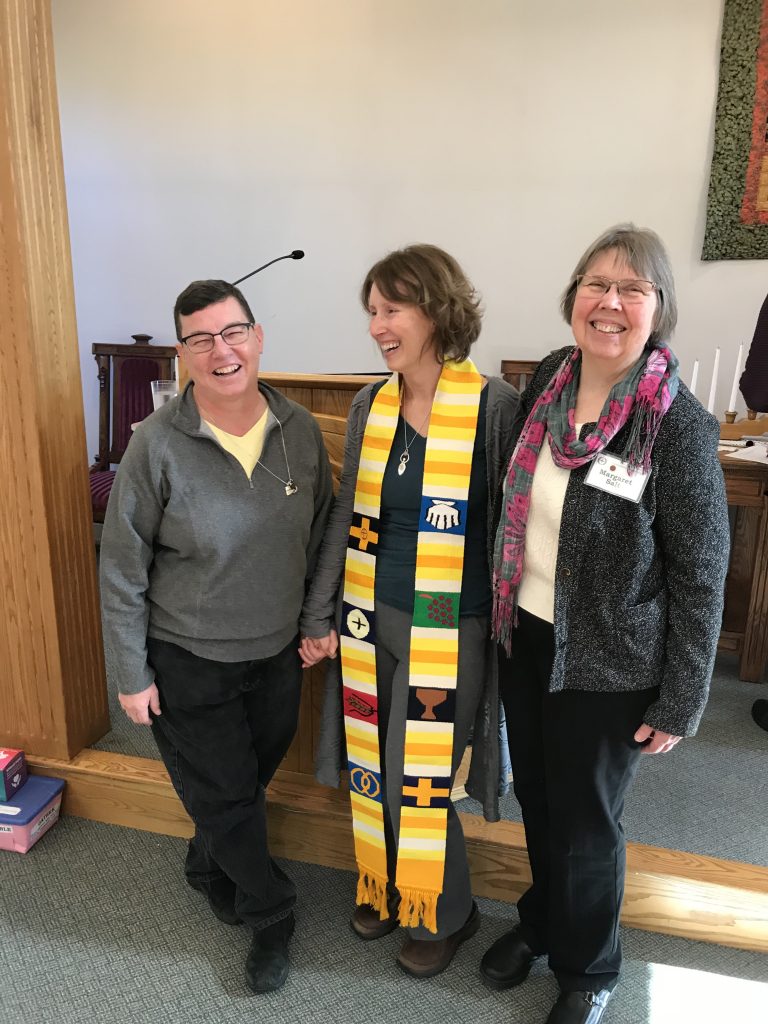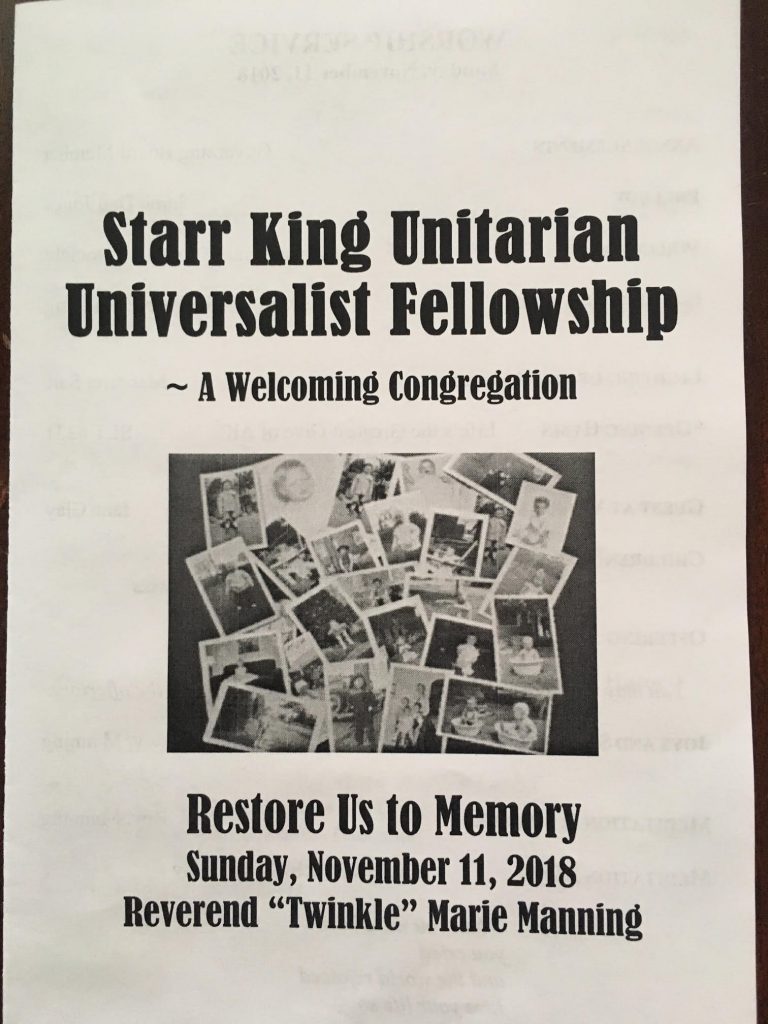
Gathering Words: Rev. “Twinkle” Marie Manning
Let turn our attention to the sacred as we consider the words of Poet David Whyte:
“Memory is not just a then, recalled in a now,
the past is never just the past,
memory is a pulse passing through all created life,
a wave form,
a then continually becoming other thens,
all the while creating a continual but almost untouchable now.
Every human life holds the power of this immense inherited pulse,
holds and then supercharges it,
according to the way we inhabit our identities
in the untouchable now.
Memory is an invitation to the source of our life,
to a fuller participation in the now,
to a future about to happen,
but ultimately to a frontier identity that holds them all at once.
Memory makes the ‘now‘ fully inhabitable.”
Let us accept this invitation and explore together this Gift of Memory.
READING BY MARGARET SALT: READING - Love Will Remain (abridged) Sheryl Crow
Sermon: Restore Us to Memory
by: Rev. “Twinkle” Marie Manning
Mnemosyne (Nem-o-scene-y), the Greek goddess of Memory,
was considered one of the most powerful goddesses of her time.
Revered during a time when Memory was of the utmost importance.
At a time long before the written word
was incorporated into language,
Memory was critical to the well-being of an individual and a society
who had to rely solely on the lessons and history passed on
in an oral tradition.
Mnemosyne is remembered as being the mother of the nine Muses,
each of which represents what could be summed up as the embodimental elements of the human experience, our expressions of:
- History
- Astronomy
- Epic and Love Poetry
- Tragedy
- Comedy
- Dance
- Music, Songs and Religious Hymns
The memory of Mnemosyne was all inclusive
— it was the memory of the rules and energies of the universe,
the cycle of life,
the people, animals and objects on Earth,
the memory of how to live in the world.
And the world, beyond.
Mnemosyne’s memory served as protection, beacon, and blessing.
Another revered female figure both Saint and Goddess,
depending on the source: is Bhrigid, or Brigit, Brigid
also closely tied to the arts, poetry and memory.
A prayer-poem dedicated to her conveys how important memories were to those of Celtic origins:
Brigid of the Mantle, encompass us,
Lady of the Lambs, protect us,
Keeper of the Hearth, kindle us.
Beneath your mantle, gather us,
And restore us to Memory.
Poetic examination of this text indicates the use of “Mantle”
associates the theme with the part of our brain
that plays a large role in the processing of information,
in consciousness, awareness…the creation of memory:
(the cerebral cortex).
We can conclude that not only is this a beseeching of
being remembered by the Deity,
but also having one’s own mind transformed
to a renewed condition of health
so that the essence of memory is whole.
This kind of desire for memory and remembrance is echoed through many religious sources.
Many believe there is an etheric Keeper of such memories,
be it Mnemosyne,
or Brigid,
or St. Peter at the Gates of the Christian Heaven.
At a human level, We are each other’s Keepers – of Memories
And, we want to share our memories with others.
Along our journeys,
In our quiet moments;
In our public exchanges;
In our pursuit of understanding the world we reside in
and our purpose in it,
We are affected by each other.
And we want to be remembered as who we know ourselves to be.
For being remembered as who we know ourselves to be
means being understood
To be understood creates a sense of belonging
Which is an intrinsic human desire,
indeed, an intrinsic human need.
Cultures around the world for millennia have left evidence
of their desire to preserve Memory.
Pictographs and Petroglyphs in Arizona;
Hieroglyphics in Egypt;
Cuneiform (Coo nā a-form) Script throughout Iraq, Iran, Syria, and Turkey
Each provide more than a mere glimpse
at primitive civilizations that once existed;
Often thought of as the mechanism to disseminate
the doctrines of gods
and dogma of humans,
These writings and pictures also give insight
as to what once were their daily lives,
family shapes and sizes,
rituals, cultural norms and power structures.
The art portrays the observations of these ancient people,
from documenting celestial representations of the solar cycle
to characterizing animals, vegetation, landscapes and waterways
of the natural, and supernatural, worlds.
Some of such, very subjective in its observational nature,
drawing attention to that which must have held significance
to the observer,
creating a better understanding between ancient artist
and present-day patron.
One such example is of rock art recently found in Egypt depicting
a herd of elephants – one of the elephants has a little elephant inside of it
representing a pregnant female.
Seemingly a small distinction,
yet at that point in history apparently a rare way of illustrating a gestating animal.
Carved between 4,000-3,500 B.C.E., this discovery in the Spring of 2017
by an expedition of archeologists led by Yale Professor John Coleman Darnell, was surprising to the archeologists.
For while Ancient Egyptian Hieroglyphics and art have been widely found throughout that region,
this discovery unveiled monument size hieroglyphs
meant to be seen and read from a great distance.
Compared to a modern-day billboard,
the location of these inscriptions show a kind of writing
that until recently was believed to be only used by
the ruling class at that time
and used for bureaucratic purposes.
Yet prominently placed where they were
on what would have been a route well-traveled by the general public,
it indicates that the messages
on this “road sign” or “wayside pulpit”
were readily accessible to the understanding of more than merely
the most privileged of the day.
In archaeological frameworks what this means
is that the clock has been turned back
and the point in time they have long-believed
the Egyptian writing system first became accessible
to the general population is much longer ago.
And while we do not know the artists and scribes by name,
their legacy,
their memory of their time on Earth, lives on,
grows and expands though these findings.
Informing those who have access to it.
Then and Now.
So it is, too, with the memories we are creating today.
Individually and Collectively.
Memory.
It is not just a recollection of
“What once happened”
Memory has a life of its own.
In the current moment.
Drawing on past, present and anticipate future to inform it.
The best way to preserve Long Term Perpetuation of Memory
is to pay attention to it as it is unfolding,
the magical and the mundane moments.
Scientists tell us memories are encoded most strongly
when we are paying attention,
when we are alert,
when we are deeply engaged
and when information is meaningful to us.
Protective measures can be put in place
to better equip us towards the preservation of memory,
For we humans have some obstacles to overcome
when it comes to what we could call “memory thieves.”
Mental and physical health problems in particular
interfere with our ability to pay attention and to recall.
Depression. Isolation.
Also strip away our mind’s ability
to hold with accuracy recollection of past memories
and encoding of new ones
as those who are in depressed and/or isolated states
are often focused on past events or future worries
and replaying such over and over in their minds
and as such they are not entirely present for current moments.
Experts in the memory field have noted that socialization is another contributing factor to whether or not our memories are strong.
Studies have shown that people with high levels
of social integration have a higher rates of recollection
- it is suggested this is because social interaction is akin to
mental aerobics,
maintaining muscle strength – muscle memory if you will.
As such interactive, uplifting conversations
are a good workout for our brains.
Stretching – like learning a new language or skill,
is like Yoga for our brains.
And while we are considering movement and exercise,
as with the rest of our body that improves its health
with physical activity that increases blood flow including to the brain.
This along with consuming nourish foods aide in the brain’s Neuroplasticity, which helps us to organize information
and be flexible and welcoming of new ideas.
And, today, perhaps more than ever in history…
Chronic Stress is a key component to memory loss.
Similar to Depression, when we are in Chronic Stress mode,
we are not fully present for much of Life’s genuine experiences.
Chronic Stress keeps our bodies on hyper-alert.
Many of us are overloaded with work,
personal and family responsibilities,
and the inundation of negative media and news,
which are responded to with increasingly urgent calls to action
- one after the other after the other,
addressing multitude of public concerns that we focus on.
Our body’s stress response mechanisms
are meant to signal our minds to become alert
and our bodies to become activate.
This physiological stress-response mobilization system
is designed to make sure we can survive in a crisis.
And then reset.
Coming back to a calmer state of Being.
Without extended calm periods, our bodies become flooded with chemicals that result in a loss of brain cells and an inability to form new ones.
This affects our ability to retain information.
It affects our ability to make good decisions.
It affects our quality of life, and the quality of Living we can engage with.
As a people of faith we affirm:
“We are a Gentle Angry, Justice Seeking, Gentle Loving People.”
With the rampant media informing us daily, even hourly,
of each impending crisis, locally, globally.
With ever-emerging movements
tugging on our bodies, minds and spirits
to contribute all that we are
in gestures of solidarity so that we can make the world new again,
We are exhausted!
And, we need to rest.
I am not suggesting we set down the mantels of social justice,
for that would be blasphemy
if ever there was such sacrilege to be named
in our creed-less faith tradition 🙂
But what I am suggesting,
What I’m imploring
And what I am asking is for you to give yourself permission to rest.
Instead of passing thru Life in a blur of pressings and pressure,
Find balance.
Practice being attentive to Nature, to people,
to the changes of the season and of the landscapes and of the sky.
Notice the light as it shines through your window each morning,
And the stars in the nighttime sky.
Notice each other!
Pause and notice how your lover’s eyes light up
when you enter a room…
Lover’s…. Let your eyes light up when your lover
enters a room.
Smile! Laugh!
Smiles and laughter make memories.
So do tears,
Take time when they are called for.
Let them flow and accept what that moment offers.
Embrace this human experience.
Take a vacation to explore something new…
Visit a sibling UU congregation once in awhile.
It is an opportunity to make connections with those who share
similar values, hopes and dreams.
Sing!
With Sarah Dan as your Music Director
I know I am truly preaching to the choir 😉
Yes, sing!
And listen to music.
And Dance.
Move as you are able.
Dine together.
Hug each other.
Hold each other.
Make memorable moments – into memories.
Yes,
- Healthy Diet and Exercise
- Carefree Socialization
- Loving Relationships
- A Sense of Community and Belonging
- Mental and Emotional Rest
- Spiritual Nourishment
All contribute to better memory storage.
All contribute to better Memory Making!
and
Restore you to memory.
May Love reside here.
May you take time to rest.
And, may you live your Life so that you rejoice!
AMEN
Restore Us to Memory Rev. “Twinkle” Marie Manning from SKUUF Plymouth NH on Vimeo.
Closing Hymn #352 – Find a Stillness

